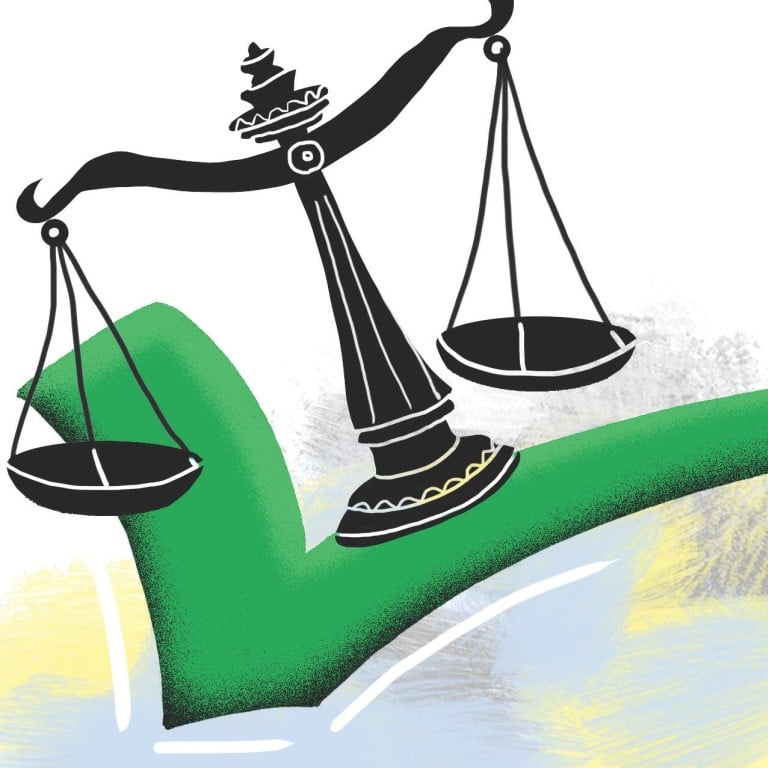
Is Hong Kong's separate system under threat, following Beijing official's comments on separation of powers?
Cliff Buddle says fears of erosion of Hong Kong's core principles are inevitable following Beijing official's speech

Zhang Xiaoming, director of the central government's liaison office, rejected the idea that the city's system implements a separation of powers and stated that the chief executive enjoys a special legal status above the government, legislature and judiciary. His comments swiftly raised concerns about the erosion of core principles which underpin Hong Kong's separate system and distinguish it from the mainland.
Zhang's speech, rather than clarifying matters, raises fresh questions. What does the speech tell us about Beijing's plans for Hong Kong? Why did this senior official choose to make controversial remarks at a ceremony to mark the 25th anniversary of the promulgation of the Basic Law?
His views on the separation of powers, a legal principle under which the executive, legislature and judiciary have separate roles and act as a check on each other's powers, target a key feature of the system put in place by the Basic Law. But Zhang's remarks are consistent with Beijing's longstanding position.
Was this a reminder that Beijing is boss, ahead of the anniversary of the Occupy Central protests and after filibustering by democrat lawmakers?
There is no separation of powers under the mainland system. The central government sees it as a Western concept unsuitable for China. It prefers to describe Hong Kong's system as executive-led, with power concentrated in the chief executive. In that sense, Zhang's views are not new.
The chief executive certainly enjoys extensive powers under the Basic Law. Hong Kong's leader controls policymaking. He has the power to reject a bill passed by the Legislative Council if he believes it not to be in Hong Kong's interests and to dismiss Legco - and call fresh elections - if it refuses to pass an important bill or the budget. Both of these powers, though, are subject to checks and balances. In both cases, if Legco stands firm, the chief executive has to resign.
But there are also powers the chief executive cannot exercise. The passing of laws is for Legco. The resolution of legal disputes is for the courts. Whether this is described as "checks and balances", a phrase Zhang seemed comfortable with, or separation of powers, does not matter; this is the system put in place by the Basic Law.

No doubt, some of those checks and balances have proved to be most inconvenient for successive chief executives. The last-minute shelving of highly controversial national security laws in 2003 is perhaps the most striking example. The power given to Legco to approve public spending and the budget has also, at times, forced policy changes.
Much of the concern about Zhang's speech has, however, focused on his suggestion that the chief executive is above the judiciary. Judicial independence lies at the heart of Hong Kong's separate system. It is an essential feature of the rule of law. The power of the courts to judicially review actions of the government is preserved by the Basic Law and its use has grown over the years. The courts have ruled against the government and have struck out legislation which conflicts with the Basic Law.
What power does the chief executive have over the judiciary? He appoints judges, but on the recommendation of an independent commission. He can also dismiss judges, but only on the advice of a panel set up by the chief justice. Court cases must be decided without interference. The Basic Law, therefore, provides safeguards to protect the judiciary's independence. History has shown, however, that the chief executive can also ask the central government for a National People's Congress Standing Committee interpretation of the Basic Law to overturn a court judgment. This has only happened once - in 1999. Given the controversy it caused, it is not a step to be taken lightly.
Zhang, in speaking of the transcendent status of the chief executive, may merely have been referring to the fact that it is Hong Kong's leader who ultimately bears the responsibility for implementing the Basic Law. The chief executive is accountable to the central government, as well as to Hong Kong. Perhaps this is all Zhang means when he talks of the core position of the chief executive and the pivotal role he plays as a link between Hong Kong and Beijing.

But such remarks understandably raise concerns in Hong Kong. Was this a reminder that Beijing is boss, ahead of the anniversary of the Occupy Central protests and after filibustering by democrat lawmakers? Or are the comments intended to pave the way for some restriction of Hong Kong's autonomy or separation of powers?
Might the chief executive, for the first time, use his power to reject a bill passed by Legco or to dismiss the legislature? Will the NPC Standing Committee, for the first time, use its power to invalidate a law passed in Hong Kong? Is it possible that the chief executive will refuse, for the first time, to appoint a judge recommended by the Judicial Officers Recommendation Commission? Will we see another Standing Committee interpretation of the Basic Law, perhaps curbing the powers of Legco or the judiciary, or overturning a court judgment?
These would be drastic measures with the potential to gravely undermine the "one country, two systems" concept. There is nothing in Zhang's speech that suggests they are in the pipeline.
His speech, though, will ensure that any steps perceived to restrict the city's autonomy or separation of powers will be closely watched. In the meantime, the speech and ensuing debate have served to increase awareness of the sophisticated system of checks and balances put in place by the Basic Law.

